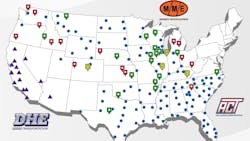Knight-Swift CFO: ‘California was a game changer for us’
A nice surprise from a recent acquisition just might give Knight-Swift Transportation Inc. a leg up during a freight market recovery that CEO Adam Miller expects will be “something of a grind.”
Speaking to analysts after Phoenix-based Knight-Swift, No. 3 on the FleetOwner 500: For-Hire, reported its third-quarter results, Miller and CFO Andrew Hess said they’ve been pleasantly surprised by customers’ reaction to their move into California courtesy of Knight-Swift’s purchase of Dependable Highway Express’ less-than-truckload division this summer. As they finish up the integration of DHE’s systems, Miller and Hess expect good things ahead in the Golden State as well as Arizona and Nevada.
“We think California was a game changer for us,” Hess said on an October 23 conference call. “We’ve seen sort of all-time highs on shipment count in that business and we have a lot of demand, I think, we can capture. […] California for us had, in our view, outside strategic importance […] We feel like that is a very important part of what’s going to give us some tailwind.”
The $185 million DHE deal grew Knight-Swift’s terminal and door counts by about 10% and extended the company’s network coverage to roughly 70% of the U.S. population. DHE’s footprint adds to the LTL presence (see the map above) that Knight-Swift built by buying AAA Cooper Transportation and Midwest Motor Express since 2021—and looks set to pay quick dividends.
“We have a lot of truckload customers that we have very close relationships with that are very large shippers,” Miller said. “Some of them were a little reluctant to leverage the AAA and NME network until we had California. That was a big piece for them. And so as soon as we announced DHE, we had several customers reach out and say, ‘Hey, when can we start?’”
Buying DHE sets up Knight-Swift to connect its other operations to the Southwest by adding terminals in the way it has filled gaps between MME and ACT, as evidenced by the green, red, and gold pins in the map above. From there, Miller told analysts that the company would look to the Northeast for deals that would create a national LTL network.
See also: Knight-Swift Transportation acquires regional LTL carrier Dependable Highway Express
Knight-Swift produced net profits of $30.5 million in the three months ended Sept. 30, which was roughly half its bottom line from the same period in 2023. Total revenue fell 7% to $1.88 billion, and operating profits were flat year over year, but net income fell in part because of higher tax expenses and the write-off of more than $13 million invested in a technology venture. The company’s truckload operating ratio held steady from 2023’s Q3 at a little more than 96%, while its LTL operating ratio increased by about four percentage points to 92.5%, largely because of its investments in new facilities.
Speaking to the broader operating environment, Miller echoed several of his executive peers by saying that the worst of the freight recession is likely behind the sector and that the recovery will be steady from here. And that, he added, will benefit larger players such as Knight-Swift and other publicly traded carriers.
“I don’t expect there to be a real sharp inflection. I think it’s somewhat of a grind upwards,” Mille said. “But that’s probably okay because some of those sharp inflections create almost a gold rush for the small carriers because you see the spot rates really jump dramatically—and I think that may keep more capacity in the market. [As] you have a progressively better market that’s building over time, I think the larger well-capitalized asset players that are the stronger performers typically see an outsized amount of opportunities.”
Shares of Knight-Swift (Ticker: KNX) were essentially unchanged the day Miller and Hess reported the company’s results. They have risen about 2% since and were changing hands around $53.80 on the afternoon of Oct. 28. The company’s market capitalization is now about $8.7 billion, an increase of more than 10% from six months ago.
About the Author
Geert De Lombaerde
Senior Editor
A native of Belgium, Geert De Lombaerde has more than two decades of experience in business journalism. Since 2021, he has written about markets and economic trends for Endeavor Business Media publications FleetOwner, Healthcare Innovation, IndustryWeek, Oil & Gas Journal, and T&D World.
With a degree in journalism from the University of Missouri, he began his reporting career at the Business Courier in Cincinnati. He later was managing editor and editor of the Nashville Business Journal. Most recently, he oversaw the online and print products of the Nashville Post and reported primarily on Middle Tennessee’s finance sector and many of its publicly traded companies.

